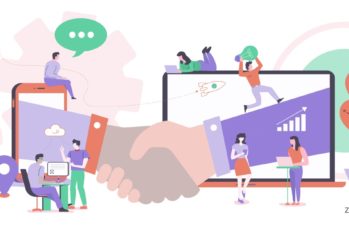Today’s workforce consists of three generations of employees, and this year, one is set to comprise 50 percent of it all — Millennials. In 2020, the Millennial generation is going to make up half of the American workforce, and B2B companies wanting to connect with these digital native decision-makers will have to rethink their marketing strategies.
Not all Baby Boomer and Generation X marketing strategies work when it comes to effectively reaching Millennials. However, there are also some stereotypes that Millennials have become known for that don’t match up with how they really make purchasing decisions and how they want to work with companies when making those decisions during the B2B buying cycle.
With more than 70 percent of Millennials involved in making B2B purchase decisions, their preferences and behavior are major factors in any B2B marketing plan. But companies need to tread carefully when reaching out to them, and it’s highly imperative to dispel fact from fiction when it comes to understanding what factors influence Millennials’ purchasing choices.
Here are five things (some debunking a few misconceptions) B2B companies should know about how to effectively engage Millennial buyers.
Face-to-Face Engagements are Preferred
Millennials are typically known to be always online, but they are grappling with technology overload and crave a break from their digital life. For a generation that wakes up with their smartphones, asks Alexa to check their calendar and reads messages before even getting out of bed, work can often turn into anxiety. All these things are also reasons why Millennials have transitioned from FOMO (fear of missing out) to JOMO (joy of missing out).
And when it comes to making important business decisions, in particular, Millennials would rather have in-person interactions. According to a survey conducted by Ketchum, 61 percent of Millennials would prefer to conduct new business meetings face-to-face. So meet them over coffee or schedule some time to chat with them over dinner. When it comes to a B2B purchasing journey, Millennials want more in-person contact and less digital isolation.
Personalization is King
Over 76 percent of Millennials prefer to build a personal relationship with a vendor or partner than read a company’s product email. Any piece of generic marketing material sent to Millenials is likely to go over their heads. It’s essential to find out as much as you can about the background, needs and wants of the prospective Millennial buyers you’re seeking to engage before you begin marketing to them.

It’s important to speak to their individual requirements. At Zen Media, in our own B2B research, we found that B2B Millennial buyers dislike being offered extra services or products they did not need. These connected business professionals feel qualified to determine their own needs for products and services and will likely turn away from any communication pushing bulk offerings.
Additionally, one way businesses can personally engage with Millennial buyers is through having a presence on social media. We found that, while B2B businesses would not always think it necessary to have a presence on social media, B2B Millennial buyers still expect to be able to connect with companies through these platforms. They are also no less demanding than other connected consumers on social media with 87 percent of business buyers saying that they expect an immediate response when seeking support on social media.
Recommendations from People are Trusted More than Information from Digital Channels
When seeking information on a product or service, B2B Millennial buyers trust the recommendations and opinions of other people over information published in online channels (websites, emails, product review forums, etc.) or the media (business news sources, trade publications). They have the most confidence in company and industry colleagues, and even the word of family and friends is highly regarded.
B2B Millennial buyers also see industry experts as trusted sources, so businesses would do well to have company representatives serve as thought leaders within their perspective sectors or specialties. As a rep, some ways for you to gain credibility through thought leadership include:
- Using a section of your company’s website as a platform to blog about your industry
- Connecting with other industry thought leaders and contributing content on their platforms
- Publishing other helpful materials — Our research shows that guides and white papers are some of the most popular forms of content amongst connected business professionals
- Podcasting or hosting webinars with other industry experts
- Taking part in industry discussions on Twitter or by joining professional communities on LinkedIn Groups or Facebook Groups
By being more of a helper and less of a salesperson, you’ll be able to build the kind of trust that B2B Millennial buyers seek choosing who to work with.
Profit Overtakes Purpose
While demonstrating authentic social responsibility is considered a major factor for connected consumers, B2B Millennial buyers prefer price and performance over working with socially-conscious businesses. Only 49 percent think it’s very important to work with a company that has a strong social purpose, while 81 percent value reliable service and 76 percent prioritize cost.
These facts also correlate with our own findings. Our study revealed that when connected B2B Millennial buyers review a company’s website, finding out information on price was second only to product specs. As a result, we can assume that they already know the company has products, solutions, or services to meet their needs and just want to know the price points. This also implies that these buyers are comparing the item’s price with that of other similar products. In our survey, several individuals cited their company’s policies for their focus on price, as well as the sense of “getting a deal.”
In addition to the key role price plays during the purchase journey, we observed how B2B is weighing vendors as separate entities from brands, taking account of not only who made the product but whom is selling it.
Finally, many buyers were looking for company reviews before even looking at one’s offerings or prices. This suggests that they were most focused on receiving high-quality customer service. It also ties into how B2B Millennial buyers view salespeople separately from the companies they work for — perhaps implying that the experience they receive from salespeople may be a perception of the service that their account managers of customer service agents will provide after making a purchase with the company.
Essentially, B2B Millennial buyers are opting for items that can be measured and will help them get rewarded in their jobs. So, while purpose is still a factor, it’s more important to focus on their individual needs and professional development.

Millennials Work Like Mad and Actually Like Being “Always On”
Contrary to the perception that Millennials prize work-life balance more than working hard, approximately 40 percent of Millennials in B2B decision-making roles spend five hours or more looking at work-related content outside of working hours. This includes reading work emails first thing in the morning (over personal emails or social media). They like being “always on”, considering it part of their personality, and value their work so much that they are actually turning away from work-life balance and moving towards burnout.
That being said, companies should look at how their products or services may be helping or hurting them. Is, for instance, your AI-intelligent machine learning solution taking the mundane and time-consuming task of data gathering off their plate? Or is it making things more difficult for them to decipher information from the data gathered?
On the purchase journey, are you providing B2B Millennial buyers with pages and pages of highly-detailed, long-winded sales documents that include information on extra services or products they don’t need? Or do you offer them a demo that makes it easy for them to see how your product or service really works and offers the opportunity for you to talk to them about how it can meet their specific needs and company requirements?
Are you adding to their exhaustion? Or are you providing them with solutions to lessen their chances of burnout?
The assumptions we make about Millennials as consumers are not necessarily true when it comes to them as connected business people. They’re digital natives but still prefer in-person interactions. They appreciate companies that have a social mission but their decisions are swayed more by price and high-quality customer service. They work like crazy but many like this “always on” lifestyle.
When it comes to working with prospective B2B Millennium buyers, companies can win the valuable business of this increasingly influential generation by:
- Offering them a personal touch during their purchase journey and making time for face-to-face engagements
- Being approachable, active, and personable on social media
- Focusing on their business and professional development needs over showcasing your CSR (while keeping in mind that purpose is still a factor)
- Becoming a credible expert by producing helpful content and getting involved in industry discussions and with professional groups online
- Showing them how your product or service can make their work life easier or help them grow into a new role within their companies and ensuring that their purchase journey is as seamless as possible




